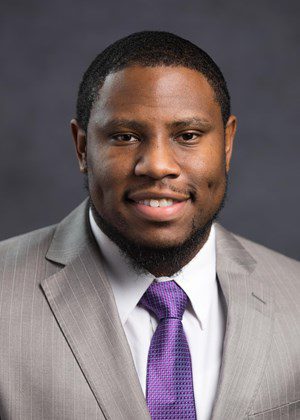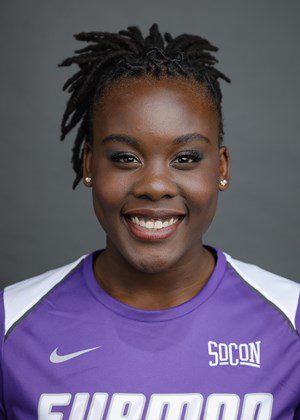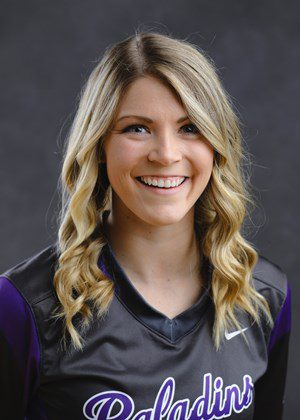Eyes and hearts opened, voices raised amid national BLM movement

Furman Women’s Basketball Coach Jackie Carson ’00 could not remain silent after the death of George Floyd on May 25.
In an emotional letter on social media, she wondered how much longer she could wait to tell her daughters, ages 8 and 6, that “one day, someone will think less of them, or hurt them, simply because of their skin color.”
“Normally I stay pretty quiet on stuff, but this is not something I feel like I can be quiet about as an African American female leader, on campus or anywhere,” Carson said.
She met with her team not long after May 25, where players shared their feelings of confusion and sadness, and she told them the reason for her public statement. They responded by releasing one of their own:
This is Furman Women’s Basketball. Our ladies wanted to make their own statement about their feelings and thoughts. So proud of you all. Thank you ladies for being DISTINCT!! May your voices and message touch many! 💜 pic.twitter.com/Z7G4Ryy9K0
— Jackie Smith Carson (@CoachCarsonFU) June 3, 2020
“They developed an amazing video. We had nothing to do with it as a staff,” Carson said. “I just felt like it was really powerful, and I was really proud of them.”
That wasn’t the only get-together in the athletic department. In addition to a department-wide meeting, the football team also had a frank, closed-door conversation that Running Backs Coach David Sims called “the best experience of my career so far.”

Furman Running Backs Coach David Sims
“A big reason it was so meaningful was just the openness, the honesty, having multiple players speak up who hadn’t spoken up much so far,” he said. “It wasn’t just our black student-athletes that were speaking up. We had several of our white student-athletes who were very, very passionate and very, very open about it as well. It left you with a little bit of hope, because one of the biggest ways to try to help solve this is going to be from having conversations.”’
Like Carson, Sims felt he had no choice but to become more vocal after Floyd’s death.
“If we’re ever going to have positive changes that we want as a country, this is a time to do it,” he said. “I try to do it in a respectful manner, but it’s one of those things, too, where I’m trying make sure my guys understand, hey, this is a call we’ve all felt, and we all have an ability to actually contribute.”
Tierra Hodges ’21, a health sciences major and forward on the women’s basketball team, said support from the university, both in asking for people’s feelings and allowing them to be openly expressed, has been welcome.
“Them taking the time to create these meetings and let us know that they’re with us and they’re supporting us, I think that made the biggest difference,” she said. “A lot of people have been silent for so long, and it feels like being silent (says) you’re OK with it.”
Hodges’ teammate, Grace Van Rij ’22, said she has wanted to speak up in support of racial justice but hadn’t known how until now.
“I was scared at first because I thought it wasn’t my place, and I thought I would say the wrong things and I would overstep,” Van Rij, who is white, said. “I didn’t feel like I was educated enough to speak on it. But then when we had our Furman athlete meeting on this I got to hear the perspectives of many of the students and coaches affected by what is going on, and it really helped me see how I can help.”
The experience left her changed: “I feel like the one upside of this is I understand what Black Lives Matter means now.”
But if this moment is truly to be different from the other tragic number of black deaths at the hands law enforcement in recent years, the current momentum for change must be maintained, Sims said. A good start would be formal recognition and the observance as a federal holiday of Juneteenth, which commemorates the day the last enslaved people in the U.S. learned of their freedom on June 19, 1865.
“Juneteenth is one of those things that has never been celebrated like it should have,” Sims said. “A lot of people are talking about making it a national holiday, and I think we should.”

Tierra Hodges ’21
Carson had learned about Juneteenth as a child, thanks to her upbringing.
“My mom is from Texas, so we learned about (Juneteenth) really, really young. But I never learned about it in school,” Carson said. “I think the good part about a lot of this is people are hearing about it.”
She wants to see that learning continue.
“We need to have constant dialogue … We need to have conversations with professors and staff members and incoming freshmen and current students, so that it is a part of Furman’s curriculum,” she said. “I think that it’s necessary. It forces the conversation and doesn’t let it die down. (The women’s team) is going to be very vocal. We’re not going to hide from this. We may get backlash, and I told them I’ll take it all day long, but I don’t want them to be scared of invoking change.”
Whether the Floyd’s death is a pivotal moment in American history remains to be seen. But it will always mark the day Lauren Duggar ’19 wouldn’t – couldn’t – look away any longer.
“I made myself watch every second. I made myself listen,” Duggar said of the agonizing video documenting the 7 minutes and 46 seconds Minneapolis police officer Derek Chauvin knelt on Floyd’s neck until he died, hand in pocket, as Floyd said he couldn’t breathe and bystanders begged him to stop. “I made myself be educated about what happened so that it could sit with me. Nothing that you come up with in your mind could justify it.”

Lauren Duggar ’19
Duggar had never joined the battle being fought by the Black Lives Matter movement since 2013 to draw attention to and reshape the narrative around systemic racism, but watching Floyd, an African American, die in a “really brutal and public way” made it impossible for her to do nothing. So, her heart and mind opened like never before, Duggar reached out to black friends to ask how she could help them.
All said the same simple thing: Get off the sidelines. Days later, on June 7, she did just that when she participated in a justice and prayer walk in Charleston, South Carolina, organized by Grace City Church.
“I kept hearing, ‘Be a part of it, because we need the white community to be by our side through this,’” said Duggar, a health sciences major who played center field for the Furman softball team and is currently in dental school at the Medical University of South Carolina.
“We spent those 3 miles walking beside someone we had just met but feeling really real and raw emotion,” said Duggar. “He was like, ‘That could have been me.’ Every step we took we were fully cognizant of the fact we were beside somebody who feels this injustice every day.”
The walk was one of hundreds of marches and demonstrations that have swept across the country and world in the wake of Floyd’s death. A seismic shift in public opinion about black deaths at the hands of police officers, coupled with the removal of at least 20 Confederate monuments since Memorial Day, indicate that Duggar is far from alone in feeling the time is now for change.